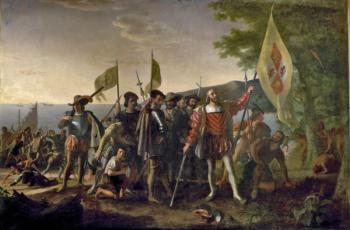 "To invade, search out, capture, vanquish, and subdue all Saracens and pagans whatsoever, and other enemies of Christ wheresoever placed, and the kingdoms, dukedoms, principalities, dominions, possessions, and all movable and immovable goods whatsoever held and possessed by them and to reduce their persons to perpetual slavery."
"To invade, search out, capture, vanquish, and subdue all Saracens and pagans whatsoever, and other enemies of Christ wheresoever placed, and the kingdoms, dukedoms, principalities, dominions, possessions, and all movable and immovable goods whatsoever held and possessed by them and to reduce their persons to perpetual slavery."
From the Romanis Pontifex by Pope Nicholas V to King Afonso V of Portugal, 1455
Newcomb, Steve. Five Hundred Years of Injustice. Shaman's Drum. Fall 1992, pp. 18-20.
Newcomb, Steven T. Pagans in the Promised Land: Decoding the Doctrine of Christian Discovery. Golden, Colorado: Fulcrum Publishing, 2008.
Robertson, Lindsay Gordon. Conquest by Law: How the Discovery of America Dispossessed Indigenous Peoples of Their Lands. Oxford: Oxford UP, 2005.
Websites
Primary
Casas, Bartolome De Las. Bartolome De Las Casas Debates the Subjugation of the Indians, 1550. The Gilder Lehrman Institute of American History. N.p., n.d. Web. 24 July 2012.
Pope Alexander V. The Doctrine of Discovery, 1493. The Gilder Lehrman Institute of American History. N.p., n.d. Web. 24 July 2012.
Davenport, Frances Gardener. European Treaties bearing on the History of the United States and its Dependencies to 1648. Carnegie Institution of Washington. Washington D.C.: 1917.
Secondary
Newcomb, Steve. Five Hundred Years of Injustice. Shaman's Drum. Fall 1992, pp. 18-20.
Newcomb, Steven T. Pagans in the Promised Land: Decoding the Doctrine of Christian Discovery. Golden, Colorado: Fulcrum Publishing, 2008.
Robertson, Lindsay Gordon. Conquest by Law: How the Discovery of America Dispossessed Indigenous Peoples of Their Lands. Oxford: Oxford UP, 2005.




